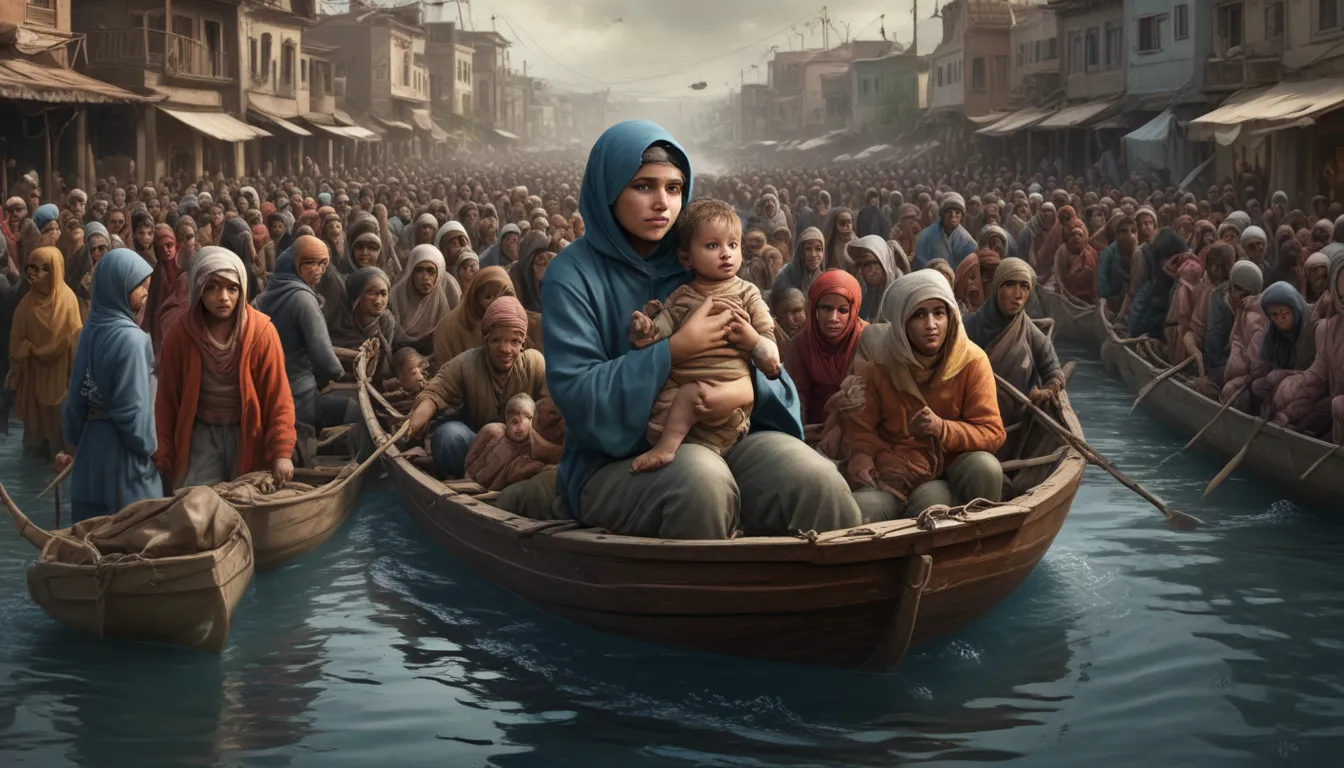A Note About Images: The images used in our articles are for illustration purposes only and may not exactly match the content. They are meant to engage readers, but the text should be relied upon for accurate information.
The issue of refugee crises and forced displacement is a pressing global concern that affects millions of individuals, families, and communities worldwide. From conflicts and persecutions to natural disasters, the reasons for displacement are varied and complex, leading to profound challenges for those forced to leave their homes in search of safety and security. In this article, we will delve into 10 captivating facts about refugee crises and forced displacement, shedding light on the realities faced by refugees and the impact it has on global communities. By understanding these facts, we can gain a deeper appreciation for the resilience and strength demonstrated by refugees and work towards finding sustainable solutions to address forced displacement around the world.
Key Takeaways:
- Refugee crises affect millions of people, with children and women facing unique challenges. International cooperation and support are crucial in addressing the root causes and providing safety for displaced populations.
- Climate change, conflict, and long displacement periods are key factors in refugee crises. Refugees bring valuable skills and contributions to host countries, and education for refugee children is essential for their future.
The Staggering Number of Refugees Worldwide
The global refugee crisis has reached unprecedented levels, with an estimated 79.5 million people forcibly displaced from their homes, including 26 million refugees. This influx of displaced individuals places immense pressure on countries and humanitarian organizations to address the needs of those fleeing conflict, persecution, and violence. The sheer scale of forced displacement highlights the urgency of finding effective solutions to support and protect refugees around the world.
Challenges Faced by Refugee Children
Out of the millions of refugees globally, over half are children who often face limited access to education. Various barriers such as lack of schools, language obstacles, and limited resources prevent many refugee children from accessing quality education. This educational gap not only hinders their personal development but also jeopardizes their chances of a brighter future. Providing adequate educational opportunities for refugee children is crucial in breaking the cycle of poverty and ensuring their well-being.
Vulnerabilities of Women and Girls in Refugee Crises
Women and girls are particularly vulnerable during refugee crises, facing heightened risks of gender-based violence, exploitation, and trafficking. Limited access to healthcare and inadequate sanitary conditions further exacerbate their challenges. Addressing the specific needs and protecting the rights of refugee women and girls is essential for promoting their safety, health, and well-being in times of displacement.
Host Countries and the Burden of Refugees
Contrary to popular belief, the majority of refugees are hosted by developing countries rather than wealthy, Western nations. Countries like Turkey, Colombia, Pakistan, and Uganda bear the largest burden in hosting and supporting displaced populations, despite facing their own economic and social challenges. Recognizing the significant contributions of host countries in providing safety and support for refugees is vital in fostering global solidarity and cooperation.
The Role of Climate Change in Forced Displacement
Climate change is increasingly contributing to the forced displacement of communities around the world. Natural disasters, environmental degradation, and extreme weather events force people to leave their homes in search of safety and viable living conditions. Rising sea levels, droughts, and other climate-related phenomena have profound consequences, highlighting the urgent need for sustainable solutions to address the impacts of environmental displacement.
The Perilous Journeys of Refugees
Refugees embark on long and arduous journeys in search of safety and a better life, often facing treacherous border crossings, dangerous sea voyages, and challenging travel conditions. The physical and emotional toll of these journeys is immense, underscoring the urgent need to address the root causes of forced displacement and create pathways for safe and legal migration. Recognizing the resilience and courage of refugees in their pursuit of safety is essential in fostering empathy and understanding.
Contributions of Refugees to Host Countries
Refugees bring valuable skills, talents, and experiences to host countries, contrary to common misconceptions. Many refugees contribute to the social and economic fabric of their host communities, enriching societies with their diverse perspectives and expertise. Providing opportunities for refugees to harness their skills and capabilities can lead to mutual benefits and shared prosperity within host countries.
Prolonged Displacement and its Impact
For many refugees, displacement is not a temporary challenge but a prolonged and enduring reality. The average duration of displacement is nearly 20 years, during which individuals and families experience significant upheaval and uncertainty. Living in limbo, separated from their homes and communities, underscores the need for long-term solutions that address the complexities of forced displacement and support the well-being of refugees.
Addressing Conflict as a Root Cause of Refugee Crises
Conflicts and wars are primary drivers of refugee crises, uprooting millions of people and leaving them with no choice but to seek refuge in safer regions or countries. The devastating impact of armed conflicts, persecution, and human rights violations underscores the urgency of promoting peace, stability, and conflict resolution to prevent future displacement. Addressing the root causes of conflicts is essential in creating sustainable solutions for refugees and affected communities.
The Importance of International Cooperation in Addressing Forced Displacement
Given the global nature of forced displacement, international cooperation and solidarity are essential in addressing the challenges faced by refugees and displaced populations. By working together, countries can develop comprehensive strategies to address the root causes of displacement, provide adequate support and protection for refugees, and promote long-term solutions that ensure the safety, dignity, and well-being of displaced individuals. Collaborative efforts at the international level can lead to more effective responses to refugee crises and foster greater resilience within affected communities.
Conclusion
The refugee crises and forced displacement represent complex and multifaceted challenges that require global attention and concerted action. By understanding the facts surrounding these issues, we can cultivate empathy, advocate for effective policies, and provide support to those who have been displaced. Shedding light on the realities faced by refugees is instrumental in fostering meaningful change and creating a more inclusive and compassionate world for everyone.
Frequently Asked Questions:
- What is a refugee crisis?
-
A refugee crisis occurs when a large number of people are forced to flee their home countries due to violence, conflict, persecution, or natural disasters.
-
How many people are affected by forced displacement?
-
According to the United Nations Refugee Agency (UNHCR), over 82 million people were forcibly displaced worldwide by the end of 2020.
-
Where do most refugees come from?
-
Countries like Syria, Afghanistan, South Sudan, Myanmar, and Somalia have produced a significant number of refugees in recent years.
-
What challenges do refugees face?
-
Refugees often face challenges such as limited access to healthcare, education, employment, discrimination, and social exclusion.
-
How can I help refugees and displaced people?
-
You can support refugees by donating to humanitarian organizations, volunteering your time and skills, advocating for their rights, and raising awareness about their situations.
-
How does forced displacement impact host countries?
-
Host countries may experience strains on resources, infrastructure, and public services as they accommodate large numbers of refugees. However, refugees can also bring economic and cultural contributions to their host communities.
-
What is the difference between a refugee and an internally displaced person (IDP)?
-
A refugee crosses an international border seeking safety, while an internally displaced person remains within their country but has been forced to flee their home.
-
How long does it take to resolve a refugee crisis?
-
Resolving a refugee crisis can take years or even decades, depending on the underlying causes and the political will of countries involved in finding a solution.
-
Are there legal frameworks to protect refugees?
-
Yes, the 1951 Refugee Convention and its 1967 Protocol provide the legal framework for the protection of refugees and their rights, though not all countries are signatories to these agreements.
-
What is the role of the international community in addressing refugee crises?
- The international community plays a crucial role in providing humanitarian aid, supporting peace negotiations, promoting regional stability, and assisting in the resettlement and integration of refugees into new communities.
In conclusion, the impact of refugee crises and forced displacement on individuals and communities is profound, underscoring the urgent need for global cooperation and solidarity. By understanding the complexities of forced displacement, advocating for effective policies, and supporting refugees with empathy and compassion, we can work towards a more inclusive and sustainable future for all.






